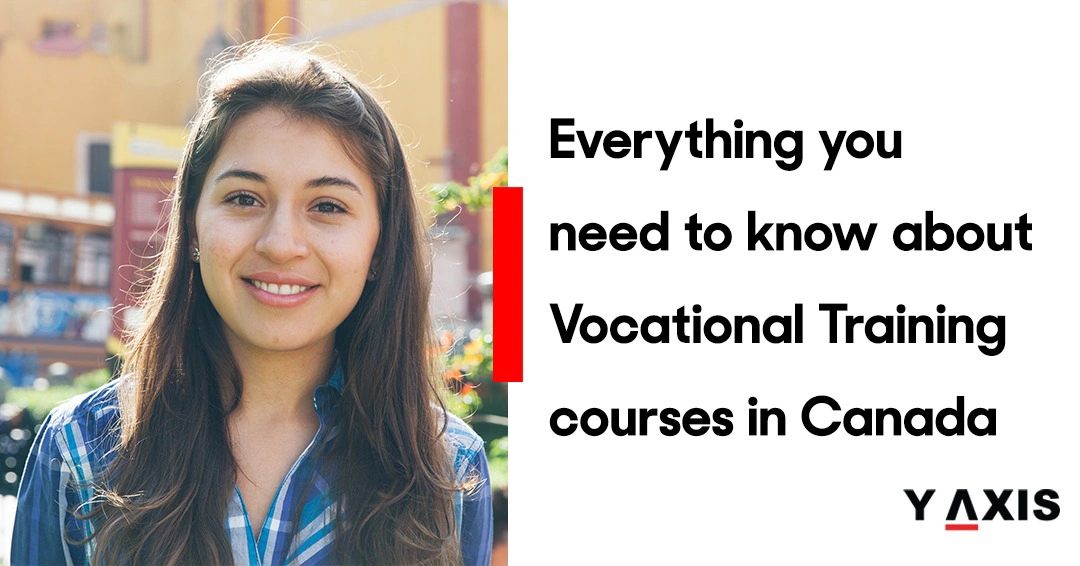Posted on August 13 2022
All you need to know about Canada’s Vocational Training courses
By , Editor
Updated October 26 2023
Key aspects Vocational Training courses
- Students may pursue vocational training courses in Canada with the help of diplomas, advanced diplomas, and graduate certificates
- 388,782 international students were recorded to enter the post-secondary education programs in Canada in 2020
- Vocational education was boosted with the Technical and Vocational TrainingAssistance Act in the 1960s
- Vocational education in Canada is primarily at the post-secondary level
- The education of the vocational courses mainly targets on providing practical knowledge to the students
- Co-operative education is an affiliated program that associates official paid work with school education
- Vocational education is inexpensive with an average tuition fee ranging from CAD 10,000 to CAD 18,000 per year
- Vocational education empowers the students for Post Graduation Work Permit (PGWP)
*Check your eligibility for Canada through Canada Immigration Points Calculator for free.
Overview:
All the interested students may pursue vocational courses in Canada with the help of diplomas, advanced diplomas, and graduate certificates that have structured co-operative education programs.
Vocational education in Canada is primarily at the post-secondary level since post-secondary education is the constitutional duty of the provinces and territories.
According to Statista Canada, 388,782 international students were recorded to enter the post-secondary education programs in Canada in 2020.
Also read...
Canada’s Start-Up Visa to welcome record number of migrants in 2022
Canada to welcome 454,410 newcomers at current pace
Canada is working on a new fast-track immigration program for foreign workers
Vocational Training courses in Canada
Vocational education has successfully been narrowing the gap in terms of employment opportunities since the demand for skilled professionals has been drastically increasing. This education mainly focuses on a particular trade and offers opportunities for the students to occupy themselves in the business.
Since skilled professionals are highly in-demand, it has driven vocational education even further and made it prevalent to everyone compared to traditional education. Vocational education is industry-oriented and specifically designed to channel an application-based study.
According to the World Bank’s 2019 World Development Report, the flexibility between vocational and conventional education helps the students compete fairly in the labor market where technology plays a significant role.
Canada is considered to be one of the popular choices among students to study overseas since it provides a wide variety of courses with affordable fees and this country has seen a surge in vocational education demand recently.
Read more…
Steps to extend your study permit in Canada
What is the cost to study in Canada for international students?
5 international scholarships to study in London’s business schools
Technical and Vocational Training Assistance Act
Vocational education was boosted with the Technical and Vocational Training Assistance Act in the 1960s and the college system in Canada, plays an important role in the training and education system compared to similar institutions in other Organization for Economic Co-operation and Development (OECD) countries.
All the students who are interested may pursue vocational courses in Canada with the help of diplomas, advanced diplomas, and graduate certificates which have structured co-operative education programs.
Vocational education in Canada is primarily at the post-secondary level since post-secondary education is the constitutional duty of the provinces and territories.
According to Statista Canada, 388,782 international students were recorded to enter the post-secondary education programs in Canada in 2020.
Every vocational school and college in Canada has eligibility criteria that students need to meet. Anyhow, it is necessary to show evidence of having proficiency in English or French (for Quebec) to proceed with vocational courses in Canada.
Read...
1 million+ job vacancies and 4% increase in the average weekly earnings in Canada
Canada restarts first All-Program Express Entry Draw issuing 1,500 ITAs
The education of the vocational courses mainly targets on providing practical knowledge to the students and where not all skills can be learned through books but can be acquired through training. In Canada. These vocational courses are offered in a shorter duration than degree courses with a lower fee comparatively. Students pursuing vocational education are permitted to work 20 hours on weekly basis offered full-time on-campus, which is quite similar to the degree programs. The majority of the vocational education programs also have a fixed co-operative education to sync and apply their leanings to the industry. By choosing Canada to complete a vocational course, these programs also permit the students to select an experience that is career-oriented in accord with the ever-changing global market.
Read on....
IRCC to implement Express Entry reforms in the first quarter of 2023
Canada continues to experience over 1 million job vacancies in 2022
Co-operative education
The Co-operative education, which is well-known as co-op, is an affiliated program that associates official paid work with school education. But this program supports an individual to work effectively and get a professional experience than a traditional study-only degree.
While working for a co-op, students must join an organization that associated with their field of study and the co-op feature of the program not only offers appropriate industry experience but also a network with prospective employers and an effective way to communicate.
Technical and professional fields Over 10,000 programs are provided in professional and technical fields at 127 publicly funded institutes, polytechnics, and colleges in Canada. The fields of vocational training include:
- Health
- Hospitality
- Design
- Agriculture
- Computer science
- Designing
- Broadcast and journalism
- Social services
There are vocational schools and colleges that are ranked all across Canada, including small cities and towns with affordable cost of living. Most popular colleges that provide vocational courses are:
- Centennial College
- Mohawk College
- Humber College
- Durham College
- George Brown College
- The University of the Fraser Valley
Most prominent courses in diploma include:
- Business entrepreneurship and management
- Tourism management and hospitality
- Sales and marketing
- Service excellence for business
- Business communications
- Web and mobile app development
Not only are the industrial programs appropriate, but vocational education is made inexpensive for students where the average tuition fee ranges from CAD 10,000 to CAD 18,000 on annual basis, depending on the program of study and college.
High number of colleges offer a fellowship to pursue vocational courses or an economical scholarship or in Canada. Moreover, the internships aided by the institutions are to help the students stay connected to the industry which may offer practical experience in a professional environment. That kind of knowledge increases value to a resume of an individual.
Additionally, the educational institutions also execute job fairs to support international and local students land jobs as per their choice and vocational education empowers the students for Post Graduation Work Permit (PGWP).
Read more...
Canada announces open work permit for PGWP holders
Canada extends Post-Graduation Work Permit (PGWP), expired after September 20, 2021
For more information, visit the Y-Axis Blog Page…
Canada is a popular destination for vocational programs which is chosen by most of the students and these vocational programs are considered as a quick entry into the workforce and career-focused. Pursuing this course in Canada may help in building a rewarding career without spending extra money.
Do you want to migrate in Canada? Get guidance from Y-Axis, the leading Overseas Consultant in Australia
If you found this article engaging, continue to read…
Canada continues to experience over 1 million job vacancies in 2022
Higher standard of Canadian immigration to address labor shortages
Tags:
Study in Canada
Vocational Training
Share

